初中英语动词时态复习讲义
初中英语知识归纳总结——动词的时态

初中英语知识归纳总结——动词的时态动词的时态(一)教学重点一般现在时在英语中,不同时间里以不同方式发生的动作或存在的状态,要用不同的动词形式来表示,动词的这种不同形式称为动词的时态。
时态从时间上划分,可分为四大类:现在时;过去时;将来时;过去将来时。
从行为上,每一类可以分为四种形式:一般式;进行式;完成式;完成进行式。
这样英语的动词合起来,总共有十六种时态,初中只需掌握其中的八种时态。
1、一般现在时(1)一般现在时表示现在的状态、习惯性的动作或主语所具备的性格和能力等。
①当动词是be时,第一人称用am,第二人称用is,其他人称用are.②当动词是实义动词时,一般用动词原形,但如果主语是第三人称单数时,动词必须用第三人称单数形式,其变化规则如下:助动词do(第三人称单数用does)构成否定句、疑问句及答语,但要注意助动词后原来的谓语动词要恢复原形。
例如:I like music.I don’t like music.Do you like music?Yes, I do No, I don’t(2)一般现在时的用法①表示经常、习惯性动作,常和often, usually, every day, sometimes, always 等时间状语连用。
如:He goes to school by bus every day.They often play football②表示能力、职业、特征。
如:Miss Gao teaches English.Do you speak Japanese?③表示客观存在。
如:The earth moves round the sun.Time and tide wait for no man.④表示已经安排好或计划好的事。
如The plane takes off at 7:30.Classes begin at 8:00⑤在时间状语和条件状语从句中,主句用一般将来时,从句用一般现在时。
初中英语中考复习 第9讲 动词时态 备战2023年中考英语一轮复习重点知识课件

(2)表示计划、打算做某事或有迹象表明即将发生的事,如自然现象。 一般情况下用“be going to+动词原形”结构。
e.g.:—What are you going to do this Sunday?这个星期天你打算干 什么?
—I'm going to practice English.我打算练习英语。 Look at the clouds.It is going to rain.看那些云,天要下雨了。
(3)非延续性动词的完成时态不能和表示一段时间的状语连用,当它需
要与表示一段时间的状语连用时,通常要转化为延续性动词,如:
非延续性动词(短语) 延续性动词(短语)
arrive/reach
be
become
be
begin/start
be on
borrow
keep
buy
have
catch a cold close come die
(4)当时间状语为 now,at the moment,these days,this week 等或当句 中含有 look,listen 之类的暗示词时,要用现在进行时。
e.g.:He is writing a new novel these days.这些天他正在写一本新小说。
过去进行时
1.过去进行时的构成 过去进行时的构成为:was/were+动词的现在分词。
3.与现在完成时连用的副词及时间状语 a lr ea d y( 用 于 肯 定 句 ),yet ( 用 于 否 定 句 或 疑 问 句 ),ju st ,r ecen tly,la tely, ever ,never ,before,so far ,these days,in/during the past/last few years,for + 一段时间,since+表过去的时间点,since+一般过去时的从句等时间状语。
初中英语动词时态复习讲义
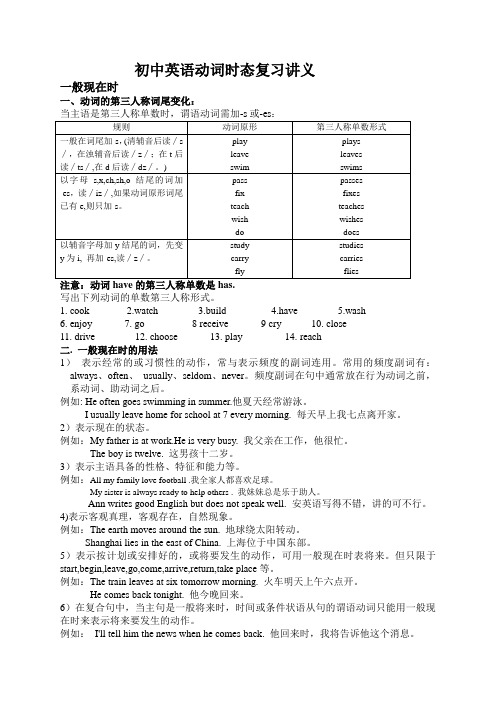
初中英语动词时态复习讲义一般现在时一、动词的第三人称词尾变化:写出下列动词的单数第三人称形式。
1. cook _______2.watch________3.build_________4.have________5.wash________6. enjoy ______7. go _________8 receive ______9 cry______10. close ________11. drive _______ 12. choose ______13. play ________14. reach ________二. 一般现在时的用法1)表示经常的或习惯性的动作,常与表示频度的副词连用。
常用的频度副词有:always、often、usually、seldom、never。
频度副词在句中通常放在行为动词之前,系动词、助动词之后。
例如: He often goes swimming in summer.他夏天经常游泳。
I usually leave home for school at 7 every morning. 每天早上我七点离开家。
2)表示现在的状态。
例如:My father is at work.He is very busy. 我父亲在工作,他很忙。
The boy is twelve. 这男孩十二岁。
3)表示主语具备的性格、特征和能力等。
例如:All my family love football .我全家人都喜欢足球。
My sister is always ready to help others . 我妹妹总是乐于助人。
Ann writes good English but does not speak well. 安英语写得不错,讲的可不行。
4)表示客观真理,客观存在,自然现象。
例如:The earth moves around the sun. 地球绕太阳转动。
Shanghai lies in the east of China. 上海位于中国东部。
(完整版)初中英语动词时态和语态讲解
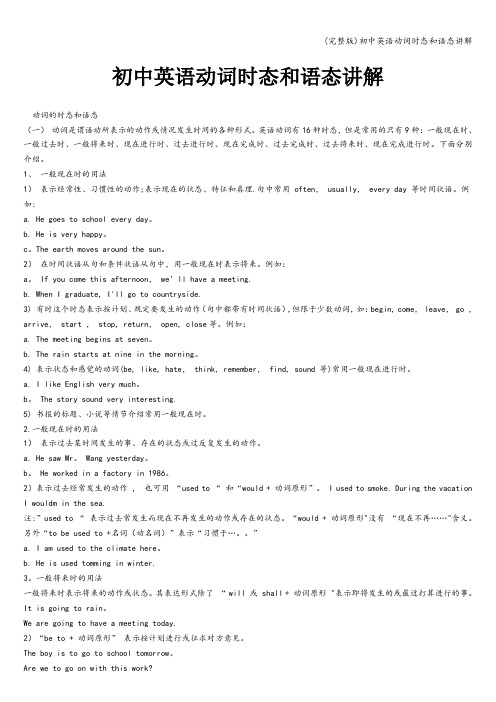
初中英语动词时态和语态讲解动词的时态和语态(一)动词是谓语动所表示的动作或情况发生时间的各种形式。
英语动词有16种时态,但是常用的只有9种:一般现在时、一般过去时、一般将来时、现在进行时、过去进行时、现在完成时、过去完成时、过去将来时、现在完成进行时。
下面分别介绍。
1、一般现在时的用法1)表示经常性、习惯性的动作;表示现在的状态、特征和真理.句中常用 often, usually, every day 等时间状语。
例如:a. He goes to school every day。
b. He is very happy。
c。
The earth moves around the sun。
2)在时间状语从句和条件状语从句中,用一般现在时表示将来。
例如:a。
If you come this afternoon,we’ll have a meeting.b. When I graduate, I'll go to countryside.3) 有时这个时态表示按计划、规定要发生的动作(句中都带有时间状语),但限于少数动词,如:begin, come, leave, go ,arrive, start , stop, return, open, close等。
例如:a. The meeting begins at seven。
b. The rain starts at nine in the morning。
4) 表示状态和感觉的动词(be, like, hate, think, remember, find, sound 等)常用一般现在进行时。
a. I like English very much。
b。
The story sound very interesting.5) 书报的标题、小说等情节介绍常用一般现在时。
2.一般现在时的用法1)表示过去某时间发生的事、存在的状态或过反复发生的动作。
中考英语动词时态复习课件【精编】

every year(每年)
once a week (一周一次)
twice a year(一年两次)
中考英语动词时态复习课件
Let’s remember:
Do you remember the words in your life? 你记得你生活中的一些常用词汇吗?
起床 吃早饭 上课 吃午饭 休息 做运动 吃晚餐 做家庭作业 看电视 上床睡觉
1.表示现在的状态: e.g. He’s twelve.
She’s at work. 2.表经常或习惯性的动作: e.g. I get up at 6:30 every day.
He reads English every morning. 3.表主语具备的性格和能力等: e.g. She likes noodles.
中考英语动词时态复习课件
定义: 一般现在时:1、表达经常性或习惯性的动作。
2、表示现在的状态。 例如: 1、我们每天都上学。
We go to school every day.
2、下课后我们打扫教室。
We clean the classroom after class.
3、有时我们在操场上踢足球 。
read novels listen to the music go toto watch the football match play games play the piano go online speak English go to the park
中考英语动词时态复习课件
I cleaned the room yesterday.
I did some cleaning yesterday.
中考英语动词时态复习课件
英语中考归纳复习专题:动词的时态
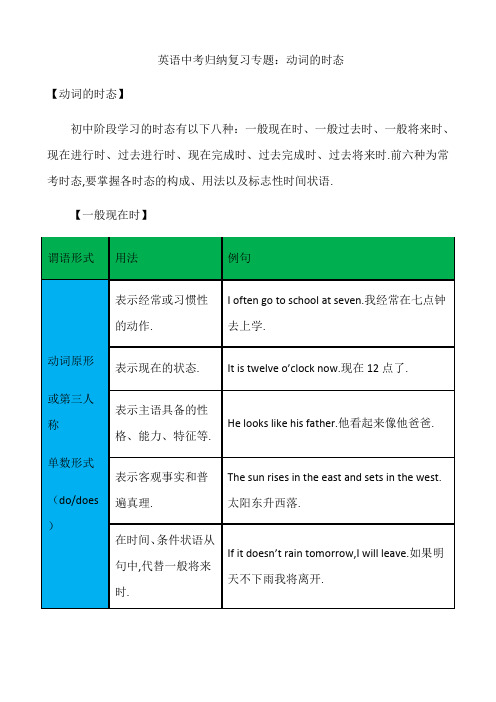
英语中考归纳复习专题:动词的时态【动词的时态】初中阶段学习的时态有以下八种:一般现在时、一般过去时、一般将来时、现在进行时、过去进行时、现在完成时、过去完成时、过去将来时.前六种为常考时态,要掌握各时态的构成、用法以及标志性时间状语.【一般现在时】【考点训练1】1.My father is a teacher and he _________ (teach) in a middle school.2.Yesterday the teacher told us the earth _______ (go) around the sun.3.—When shall we begin our meeting?—We’ll begin it when Helen ___ . ()esB.cameC.will comee4.—How do you usually go to school?—I usually ___ to school on foot. ()A.goB.wentC.was goingD.will go答案:teaches goes A A【一般过去时】要点提醒:“used to+动词原形”表示过去的习惯或状态.如:Mum used to tell us stories.妈妈过去常给我们讲故事.【考点训练2】1.Mike ________ (not go) to bed until 12 o’clock last night.2.He asked if I _____ (be) a student.3.Will you please say it again?I ___ quite ___ you.()A.don’t;hearB.didn’t;hearC.don’t;heardD.didn’t;heard4.He _____ go out with his parents,but now he ____ staying at home alone. ()ed to;is used toB.is used to;used toe to;is used toed to;used to答案:didn’t go was B A【一般将来时】要点提醒:be going to与will的区别1.be going to 指已计划好的事或思考过的意图、打算,will表示未事先思考或未计划而临时做出的决定.如:I’m going to see him tomorrow.我打算明天去看他.(事先经过思考)I’ll answer the door.我去开门.(未经事先考虑)2.be going to可表示客观迹象表明马上要发生的事,而will则表明说话者的主观意愿.如:Look at the clouds.There is going to be a storm.看看这些云,暴风雨就要来了.(客观迹象表明要发生)I hope it will be warm tomorrow.我希望明天会暖和起来.(主观意愿)3.在含有条件状语从句的复合句的主句中,一般用will,不用be going to. 如:I will come if it doesn’t rain.如果不下雨的话,我就来.【考点训练3】1.____ a concert in our school next Saturday. ()A.There isB.There areC.There will beD.There will have2.If they can arrive by 9:00 am,we ___ a meeting.()A.haveB.will haveC.hadD.would have3.He ___ her a beautiful hat on her next birthday.()A.givesB.gaveC.will givingD.is going to give答案:C B D 【现在进行时】【考点训练4】1.They ____________ (have) a math test in the classroom now.2.Look! He ___________ (lie) on the beach.3.—Pass the raincoat to me.It ___ hard now.—Here you are. ()A.rainB.is rainingC.rainedD.will rain4.—Cathy,can you answer the door?I ___ the room.—I’m coming,Mum. ()A.CleanB.cleanedC.have cleanedD.am cleaning答案:are having is lying B D【过去进行时】He was forever com plaining about something.他老是怨这怨那.要点提醒:1.在含有时间状语从句的复合句中,延续时间较长的动作常用过去进行时,另一个短暂性动作用一般过去时.如:When the UFO landed,I was shopping at the clothes store.当UFO落地时,我正在服装店买衣服.2.表示两个延续性动作在过去某一时刻同时进行,不考虑动作的先后顺序,主句和从句的谓语动词都用过去进行时,连词常用while.如:Tom was doing his homework while I was reading a newspaper.我在看报纸时,汤姆在做作业.【考点训练5】1.Mike and I ___________ (play) basketball at that time yesterday afternoon.2.While Mr.Johnson _______________ (work) in the office,the phone rang.3.The girl ___ for the bus when the rainstorm came.()A.waitedB.have waitedC.is waitingD.was waiting4.—Jenny,I called you at nine last night,but you didn’t pick up.—Oh,I ____ a popular program called Go Fighting!.()A.watchB.watchedC.was watchingD.am watching答案:were playing was working D C【现在完成时】要点提醒:1.have/has been to,have/has gone to与have/has been in(考点讲解详见P74考点1)2.延续性动词与非延续性动词英语中的动词按动作发生的方式、发生过程的长短可分为延续性动词和非延续性动词两种,非延续性动词也可称为短暂性动词或瞬间动词.在现在完成时态中,有时要将非延续性动词转换为延续性动词,这样才能和时间段连用.转换方法如下:(1)将短暂性动词转换为“be+形容词或副词”.请看下表:如:这间商店开门6小时了.The shop has opened for 6 hours.( ×)The shop has been open for 6 hours.( √)(2)有的短暂性动词可以转换为意思相同的延续性动词.请看下表:如:这本书我借了一个月了.I have borrowed the book for one month.( ×)I have kept the book for one month.( √)3.现在完成时与一般过去时的区别现在完成时强调某一动作或状态对现在造成的影响或结果,不能和表示过去的时间状语连用;一般过去时只表示过去的事实,不表示和现在的关系,可以和表示过去的时间状语连用.如I bought a ticket yesterday.我昨天买了一张票.(强调我昨天做的一件事是买票)I have already bought a ticket.我已经买了一张票.(强调我已经有票了,无须再惦记票的事了)4.现在完成时的其他句型【考点训练6】1.—you _____ your homework yet?—Yes.I ______ it a moment ago. ()A.Did;do;finishedB.Have;done;finishedC.Have;done;have finishedD.Will;do;finish2.His father ___ the Party since 1978. ()A.joinedB.has joinedC.was inD.has been in3.Miss Green isn’t in the office.She to the library. ()A.has goneB.wentC.will goD.has been 答案:B D A【过去完成时】had + 过去分词表示在过去的过去发生的动作或存在的状态.I had had three pieces of cake when you arrived.你来的时候我已经吃了三块蛋糕了.表示过去某一动作或状态持续到过去另一时间.The old man had lived in Shanghai for ten years beforeTom came here.汤姆来这儿之前,这个老人已经住在上海十年了.时间标志by the time...,before,when等构成的短语或引导的从句【考点训练7】1.在我们到达电影院之前,电影已经开始了.The film __________ before we _______ to the cinema.2.警察赶到时,小偷已经逃跑了.When the police __________,the thief____________________ .答案:had begun got arrived had run away 【过去将来时】【考点训练8】1.李明说如果布莱恩下个月来中国,他将会很高兴.Li Ming said he ___________ happy if Brian came to China the next month.2.蒂娜说她下周三打算来参加我的生日派对.Tina said she ________________ my birthday party the next Wednesday.答案:would be was going to【中考示例】(2017·广西)If he _____ Guilin,he’ll probably go to Yangshuo. ( )A.visitsB.is visitingC.will visitD.has visited【解析】考查动词的时态.句意:如果他游览桂林,他有可能会去阳朔.if引导条件状语从句时,时态遵循“主将从现”原则,从句中用一般现在时表示将来.【考题热身】1.(2017·甘肃)I promise I ________ (send) you an email to explain all of these tomorrow.2.(2017·甘肃)Be quiet! The patients ______________(sleep).3.(2017·鄂州)Sandy’s grandparents__________________ (marry) for 50 years.4.(2017·台州改编)A true friend always ____________(support) you whenever youare in trouble.5.(2017·宿迁)I ______________(wash) the dishes while my sister was sweeping the floor.6.(2017·云南)—What do you think of your hometown, Kate?—It a lot.It’s more beautiful than before. ()A.has changedB.changesC.will changeD.change7.(2017·武汉)—Linda is not coming for the party tonight.—But she ______!()A.promisesB.promisedC.will promiseD.had promised8.(2017·毕节)It’s nice to see you again.We ___ each other since 2016. ()A.won’t seeB.haven’t seenC.don’t seeD.didn’t see9.(2017·黔东南)If it doesn’t rain this weekend,we ___ a picnic in the Jinquan Park. ()A.haveB.will haveC.have hadD.had10.(2017·上海)Some exchange students ___ with their host families this time yesterday. ()A.are chattingB.will chatC.were chattingD.have chatted11.(2017·重庆B卷)—Where is your uncle?I haven’t seen him for a long time. —He _____ Beijing for about half a year.He moved there in January. ()A.has gone to B.has been toC.has arrived inD.has been in12.(2017·重庆B卷)John and I ___ to visit his grandparents last Sunday afternoon. ()A.goB.wentC.will goD.have gone13.(2017·重庆A卷)In the past few years,many schools ____ the ways of doing morning exercises. ()A.changeB.changesC.will changeD.have changed14.(2017·重庆A卷)As soon as the rain _____ ,they will go out to pick apples. ()A.stopsB.stoppedC.will stopD.is stopping15.(2017·河北)Don’t take the dictionary away.I ___ it. ()eedC.am usingD.have used答案:will send are sleeping have been married supports A B BBCDBDAC。
初中英语动词时态复习讲义

初中英语动词时态复习讲义一.一般现在时一、动词的第三人称词尾变化:1. 一般现在时的用法1)表示经常的或习惯性的动作,常与表示频度的副词连用。
常用的频度副词有:always、often、usually、seldom、never。
频度副词在句中通常放在行为动词之前,系动词、助动词之后。
例如: He often goes swimming in summer.他夏天经常游泳。
I usually leave home for school at 7 every morning. 每天早上我七点离开家。
2)表示现在的状态。
例如:My father is at work.He is very busy. 我父亲在工作,他很忙。
The boy is twelve. 这男孩十二岁。
3)表示主语具备的性格、特征和能力等。
例如:All my family love football .我全家人都喜欢足球。
My sister is always ready to help others . 我妹妹总是乐于助人。
Ann writes good English but does not speak well. 安英语写得不错,讲的可不行。
4)表示客观真理,客观存在,自然现象。
例如:The earth moves around the sun. 地球绕太阳转动。
Shanghai lies in the east of China. 上海位于中国东部。
5)表示按计划或安排好的,或将要发生的动作,可用一般现在时表将来。
但只限于start,begin,leave,go,come,arrive,return,take place等。
例如:The train leaves at six tomorrow morning. 火车明天上午六点开。
He comes back tonight. 他今晚回来。
6)在复合句中,当主句是一般将来时,时间或条件状语从句的谓语动词只能用一般现在时来表示将来要发生的动作。
初中英语时态讲解
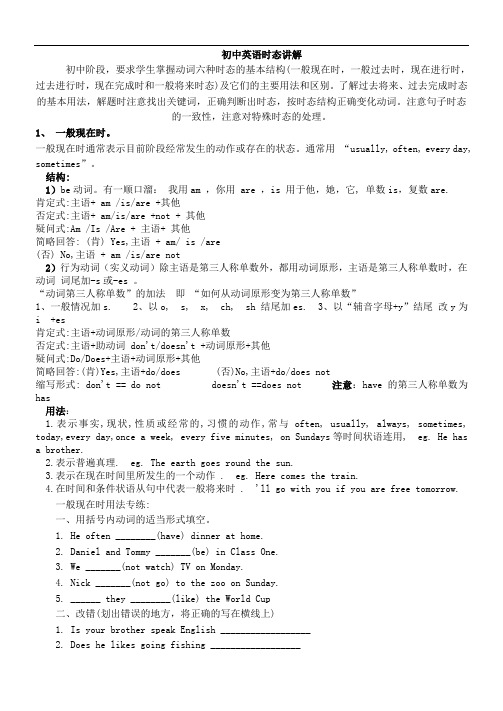
初中英语时态讲解初中阶段,要求学生掌握动词六种时态的基本结构(一般现在时,一般过去时,现在进行时,过去进行时,现在完成时和一般将来时态)及它们的主要用法和区别。
了解过去将来、过去完成时态的基本用法,解题时注意找出关键词,正确判断出时态,按时态结构正确变化动词。
注意句子时态的一致性,注意对特殊时态的处理。
1、一般现在时。
一般现在时通常表示目前阶段经常发生的动作或存在的状态。
通常用“usually, often, every day, sometimes”。
结构:1)be动词。
有一顺口溜:我用am ,你用 are ,is 用于他,她,它, 单数is,复数are.肯定式:主语+ am /is/are +其他否定式:主语+ am/is/are +not + 其他疑问式:Am /Is /Are + 主语+ 其他简略回答: (肯) Yes,主语 + am/ is /are(否) No,主语 + am /is/are not2)行为动词(实义动词)除主语是第三人称单数外,都用动词原形,主语是第三人称单数时,在动词词尾加-s或-es 。
“动词第三人称单数”的加法即“如何从动词原形变为第三人称单数”1、一般情况加s.2、以o, s, x, ch, sh 结尾加es.3、以“辅音字母+y”结尾改y为i +es肯定式:主语+动词原形/动词的第三人称单数否定式:主语+助动词 don't/doesn't +动词原形+其他疑问式:Do/Does+主语+动词原形+其他简略回答:(肯)Yes,主语+do/does (否)No,主语+do/does not缩写形式: don't == do not doesn't ==does not 注意:have的第三人称单数为has用法:1.表示事实,现状,性质或经常的,习惯的动作,常与often, usually, always, sometimes, today,every day,once a week, every five minutes, on Sundays等时间状语连用, eg. He hasa brother.2.表示普遍真理. eg. The earth goes round the sun.3.表示在现在时间里所发生的一个动作 . eg. Here comes the train.4.在时间和条件状语从句中代表一般将来时 . 'll go with you if you are free tomorrow.一般现在时用法专练:一、用括号内动词的适当形式填空。
2023年中考英语语法---动词时态专项复习知识点

2023年中考英语语法---动词时态专项复习知识点一、动词的五种基本形式动词主要用来表示动作、状态和性质,而动作和状态的发生有具体的时间和表现方式,这就是英语中动词的时态。
英语中动词的时态由动词的不同形式来表示。
英语动词的五种基本形式为:动词原形、第三人称单数、现在分词、过去式和过去分词。
如:work—works—working—worked—worked。
常见六种时态的构成及用法(1)一般现在时用法:①现在经常性的状态或动作;②客观事实和真理。
构成:①be+表语;②实义动词作谓语标志词:often, sometimes, usually, always, never,twice a month, everyday/week/month/year(every系列)例句:He usually gets to school early.他通常很早到校。
The moon moves around the earth.月亮绕着地球转。
练一练1.认识从实践开始Knowledge practice.2.如果明天下雨,我们就不去公园了。
If it tomorrow,weto the park.【答案】1. begins with.2.rains,won’t go(2)一般过去时用法:表示过去的动作或状态。
构成:①was/were+表语;②实义动词作谓语标志词:a moment ago,just now,ago, yesterday, last night/week/month(last系列) 例句:We went to Yunnan last Monday.上周一我们去了云南。
1.She (not visit)her aunt last weekend.2.My friend,Lucy, (study)for the math test and(practice)English last night.【答案】1.didn’t visit 2.studied practiced(3)一般将来时用法:表示将来的动作或状态。
(完整版)初中英语动词时态和语态讲解

初中英语动词时态和语态讲解动词的时态和语态(一)动词是谓语动所表示的动作或情况发生时间的各种形式。
英语动词有16种时态,但是常用的只有9种:一般现在时、一般过去时、一般将来时、现在进行时、过去进行时、现在完成时、过去完成时、过去将来时、现在完成进行时。
下面分别介绍。
1、一般现在时的用法1)表示经常性、习惯性的动作;表示现在的状态、特征和真理。
句中常用often, usually, every day 等时间状语。
例如:a. He goes to school every day.b. He is very happy.c.The earth moves around the sun.2) 在时间状语从句和条件状语从句中,用一般现在时表示将来。
例如:a. If you come this afternoon, we’ll have a meeting.b. When I graduate, I’ll go to countryside.3) 有时这个时态表示按计划、规定要发生的动作(句中都带有时间状语),但限于少数动词,如:begin, come, leave, go ,arrive, start , stop, return, open, close等。
例如:a. The meeting begins at seven.b. The rain starts at nine in the morning.4) 表示状态和感觉的动词(be, like, hate, think, remember, find, sound 等)常用一般现在进行时。
a. I like English very much.b. The story sound very interesting.5) 书报的标题、小说等情节介绍常用一般现在时。
2.一般现在时的用法1)表示过去某时间发生的事、存在的状态或过反复发生的动作。
a. He saw Mr. Wang yesterday.b. He worked in a factory in 1986.和“would + 动词原形”。
(详细版)初中英语动词时态和语态讲解
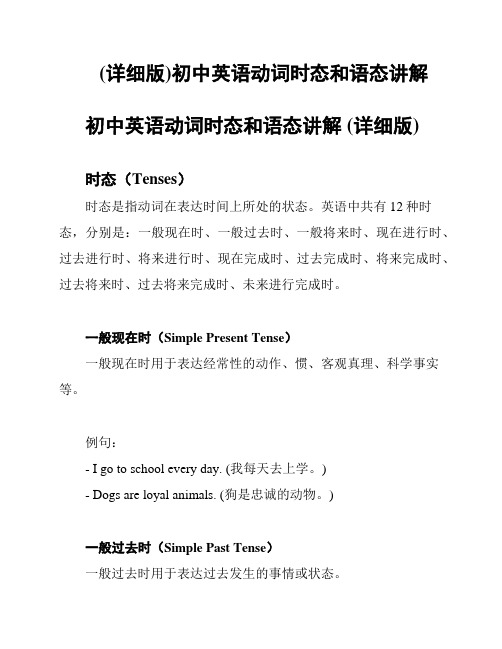
(详细版)初中英语动词时态和语态讲解初中英语动词时态和语态讲解 (详细版)时态(Tenses)时态是指动词在表达时间上所处的状态。
英语中共有12种时态,分别是:一般现在时、一般过去时、一般将来时、现在进行时、过去进行时、将来进行时、现在完成时、过去完成时、将来完成时、过去将来时、过去将来完成时、未来进行完成时。
一般现在时(Simple Present Tense)一般现在时用于表达经常性的动作、惯、客观真理、科学事实等。
例句:- I go to school every day. (我每天去上学。
)- Dogs are loyal animals. (狗是忠诚的动物。
)一般过去时(Simple Past Tense)一般过去时用于表达过去发生的事情或状态。
例句:- We visited Paris last summer. (去年夏天我们参观了巴黎。
)- She lived in Japan for two years. (她在日本住了两年。
)一般将来时(Simple Future Tense)一般将来时用于表达将来将要发生的事情或状态。
例句:- I will call you tomorrow. (我明天会打电话给你。
)- They are going to travel to Europe next month. (他们下个月要去欧洲旅行。
)现在进行时(Present Continuous Tense)现在进行时用于表达正在进行的动作。
例句:- She is studying for her exams. (她正在为考试而研究。
)- They are playing soccer in the park. (他们正在公园里踢足球。
)过去进行时(Past Continuous Tense)过去进行时用于表达过去某个时间正在进行的动作。
例句:- We were watching a movie when the power went out. (停电时我们正在看电影。
初中英语动词八大时态详解
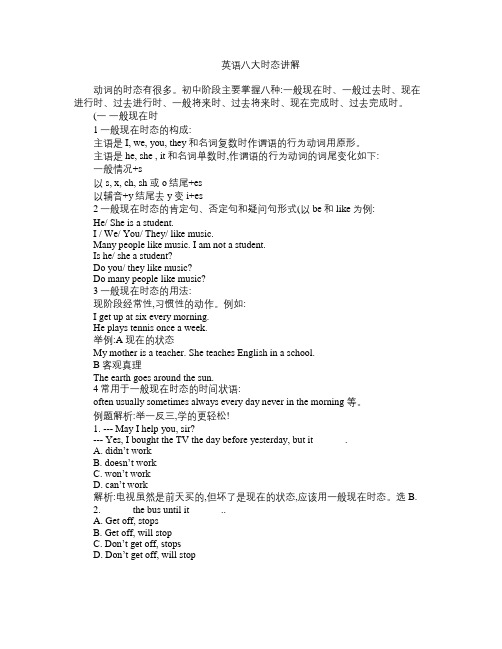
英语八大时态讲解动词的时态有很多。
初中阶段主要掌握八种:一般现在时、一般过去时、现在进行时、过去进行时、一般将来时、过去将来时、现在完成时、过去完成时。
(一一般现在时1一般现在时态的构成:主语是I, we, you, they和名词复数时作谓语的行为动词用原形。
主语是he, she , it和名词单数时,作谓语的行为动词的词尾变化如下:一般情况+s以s, x, ch, sh 或o结尾+es以辅音+y结尾去y变i+es2一般现在时态的肯定句、否定句和疑问句形式(以be和like为例:He/ She is a student.I / We/ You/ They/ like music.Many people like music. I am not a student.Is he/ she a student?Do you/ they like music?Do many people like music?3一般现在时态的用法:现阶段经常性,习惯性的动作。
例如:I get up at six every morning.He plays tennis once a week.举例:A 现在的状态My mother is a teacher. She teaches English in a school.B 客观真理The earth goes around the sun.4常用于一般现在时态的时间状语:often usually sometimes always every day never in the morning 等。
例题解析:举一反三,学的更轻松!1. --- May I help you, sir?--- Yes, I bought the TV the day before yesterday, but it ______.A. didn’t workB. doesn’t workC. won’t workD. can’t work解析:电视虽然是前天买的,但坏了是现在的状态,应该用一般现在时态。
初中英语语法动词八种时态详解
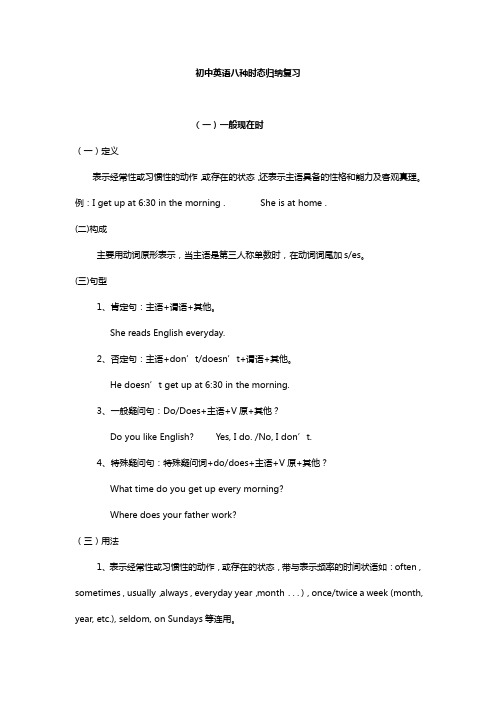
初中英语八种时态归纳复习(一)一般现在时(一)定义表示经常性或习惯性的动作,或存在的状态,还表示主语具备的性格和能力及客观真理。
例:I get up at 6:30 in the morning . She is at home .(二)构成主要用动词原形表示,当主语是第三人称单数时,在动词词尾加s/es。
(三)句型1、肯定句:主语+谓语+其他。
She reads English everyday.2、否定句:主语+don’t/doesn’t+谓语+其他。
He doesn’t get up at 6:30 in the morning.3、一般疑问句:Do/Does+主语+V原+其他?Do you like English? Yes, I do. /No, I don’t.4、特殊疑问句:特殊疑问词+do/does+主语+V原+其他?What time do you get up every morning?Where does your father work?(三)用法1、表示经常性或习惯性的动作,或存在的状态,带与表示频率的时间状语如:often , sometimes , usually,always , everyday year,month...), once/twice a week (month, year, etc.), seldom, on Sundays等连用。
I leave home for school at seven every morning.2、表示客观真理,科学事实、格言警句。
The sun rises in the east .日出东方。
The earth goes around the sun .地球绕着太阳转。
Ten minus two is eight.十减二等于八。
Light travels faster than sound .光的速度比声音的速度快。
初中英语8个动词时态时间轴、时态结构搭配图、时态简表、时态复习讲义
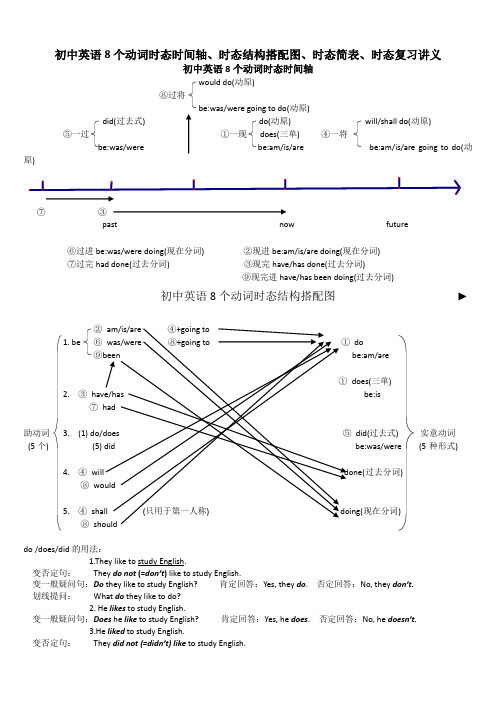
初中英语8个动词时态时间轴、时态结构搭配图、时态简表、时态复习讲义初中英语8个动词时态时间轴would do(动原)⑧过将be:was/were going to do(动原)did(过去式) do(动原) will/shall do(动原)⑤一过①一现does(三单) ④一将be:was/were be:am/is/are be:am/is/are going to do(动原)⑦③past now future⑥过进be:was/were doing(现在分词) ②现进be:am/is/are doing(现在分词)⑦过完had done(过去分词) ③现完have/has done(过去分词)⑨现完进have/has been doing(过去分词)初中英语8个动词时态结构搭配图②am/is/are ④+going to1. be ⑥was/were ⑧+going to ①do⑨been be:am/are①does(三单)2. ③have/has be:is⑦had助动词 3. (1) do/does ⑤did(过去式) 实意动词(5个) (5) did be:was/were (5种形式)4. ④will done(过去分词)⑧would5. ④shall (只用于第一人称) doing(现在分词)⑧shoulddo /does/did的用法:1.They like to study English.变否定句:They do not (=don’t) like to study English.变一般疑问句:Do they like to study English? 肯定回答:Yes, they do. 否定回答:No, they don’t.划线提问:What do they like to do?2. He likes to study English.变一般疑问句:Does he like to study English? 肯定回答:Yes, he does. 否定回答:No, he doesn’t.3.He liked to study English.变否定句:They did not (=didn’t) like to study English.初中英语8个动词时态简表(表格+图表)初中英语8个动词时态复习讲义一般现在时一、动词的第三人称词尾变化:写出下列动词的单数第三人称形式。
初中英语动词时态总复习超级精华版.ppt

close
以重读闭音节结尾的动词 ,如果末尾只有一个辅音 字母,应先双写这个辅音 字母,再加-ing
sit begin run put
-ing形式
listening spending staying
having preparing
closing
sitting beginning running
If you take the job , they will talk with you in greater details.
如果你接受这份工作,他们将和你谈谈细节。
I do my homework every day.
1.改为一般疑问句并回答。 Do you do your homework every day? Yes, I do./No, I don't. 2.改为否定句。
1.改为一般疑问句并回答。 Did you do your homework yesterday? Yes, I did./No, I didn't. 2.改为否定句。
I didn't do my homework yesterday.
三、一般将来时
1.一般将来时的结构: 结构一: 主语+will+动词原形+其它 I will do my homework tonight.
studies carries
flies
注意:动词have的第三人称单数是has.
2. 一般现在时的用法 :
1) 表示经常性的或习惯性的动作,常与表示频 度的副词连用。常用的频度副词有: always、 often、 usually、seldom、never。频度副词在句 中通常放在行为动词之前,系动词、助动词之 后。
译林版完整版初中英语动词时态讲义全
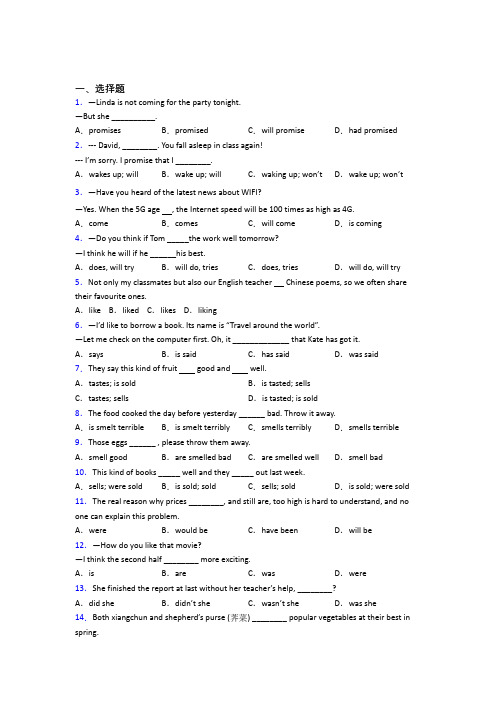
一、选择题1.—Linda is not coming for the party tonight.—But she __________.A.promises B.promised C.will promise D.had promised 2.--- David, ________. You fall asleep in class again!--- I’m sorry. I promise that I ________.A.wakes up; will B.wake up; will C.waking up; won’t D.wake up; won’t 3.—Have you heard of the latest news about WIFI?—Yes. When the 5G age , the Internet speed will be 100 times as high as 4G.A.come B.comes C.will come D.is coming 4.—Do you think if Tom _____the work well tomorrow?—I think he will if he ______his best.A.does, will try B.will do, tries C.does, tries D.will do, will try 5.Not only my classmates but also our English teacher Chinese poems, so we often share their favourite ones.A.like B.liked C.likes D.liking6.—I’d like to borrow a book. Its name is “Travel around the world”.—Let me check on the computer first. Oh, it _____________ that Kate has got it.A.says B.is said C.has said D.was said 7.They say this kind of fruit good and well.A.tastes; is sold B.is tasted; sellsC.tastes; sells D.is tasted; is sold8.The food cooked the day before yesterday ______ bad. Throw it away.A.is smelt terrible B.is smelt terribly C.smells terribly D.smells terrible 9.Those eggs ______ , please throw them away.A.smell good B.are smelled bad C.are smelled well D.smell bad 10.This kind of books _____ well and they _____ out last week.A.sells; were sold B.is sold; sold C.sells; sold D.is sold; were sold 11.The real reason why prices ________, and still are, too high is hard to understand, and no one can explain this problem.A.were B.would be C.have been D.will be 12.—How do you like that movie?—I think the second half ________ more exciting.A.is B.are C.was D.were13.She finished the report at las t without her teacher’s help, ________?A.did she B.didn’t she C.wasn’t she D.was she 14.Both xiangchun and shepherd’s purse (荠菜) ________ popular vegetables at their best in spring.A.are B.is C.will be D.were 15.—Mark’s car ________ a cloud of dust as h e drove off.—That’s why we dislike him at all.A.raised B.rose C.was raised D.was rising 16.—Stop, please! Look at the sign “No photos”over there. — Oh, sorry. I ________ it. A.didn’t notice B.haven’t noticed C.won’t notice D.didn’t do 17.— Why didn't you answer my call?— sorry. I _______ an old friend and we _______all the time.A.have met; are talking B.met; talked C.met; are talkingD.met; were talking18.Candy has decided to move to Taipei next year. When she studies in an art school there, she ________ with her aunt for five months.A.lives B.lived C.has lived D.will live 19.—The moon ________ its first female astronaut by the year 2024.—Wow, this will truly be a remarkable moment in history.A.has welcomed B.is welcomed C.welcomed D.will welcome 20.It’s reported that NASA ________ a woman to the Moon in 2024!A.sent B.send C.is sending D.will send 21.— There ______ a student science fair in our school next week.— How cool !A.was B.is C.are going to be D.is going to be 22.— What a pity that Kobe Bryant has died in a terrible accident!— Yes. But the work he has done ________ encouraging us.A.will keep B.would keep C.has kept D.had kept 23.—When ________ you ________ reading the book Little Women?—It's hard to say. I'm busy these days and have no time to continue reading.A.did; finish B.have; finished C.will; finish D.do; finish 24.—Is there anything wrong with your mobile phone?— Yes, I hope you _________.A.to repair B.to have it repaired C.have repaired it D.will have it repaired 25.—Look at the sign. It says “No photos”. We shouldn’t take photos here.—Sorry. I ________ the sign.A.didn’t notice B.don’t notice C.wasn’t noticing D.haven’t noticed 26.He’s been informed that he ________ for the scholarship because of his academic background.A.hasn’t qualified B.hadn’t qualifiedC.doesn’t qualify D.wasn’t qualifying27.As they’re handmade, each one __________ slightly in shape.A.various B.varied C.varies D.variety28.This sort of clothing material, which feels soft, ______.A.catches fire easily B.is caught fire easilyC.is easy caught fire D.is easily to catch fire29.This kind of cloth_______well and large quantities of the cloth ________.A.is sold; have been sold B.is sold; has been soldC.sells; have been sold D.sells ; has been sold30.—Why are you so upset?—I had my computer repaired yesterday, but it ________ work again.A.doesn’t B.didn’tC.won’t D.wouldn’t31.The school in library my mother works in the east of the village.A.whose;lies B.which;lay C.which;lies D.which;lying 32.We’ll go to play with snow if it ______ tomorrow.A.snow B.snowsC.will snow D.snowed33.The palace caught fire three times in the last century, and little of the original building________ now.A.is remained B.is remainingC.remains D.has been remained34.Walmart, which is one of the largest American supermarket chains, some of its stores open 24 hours on Mondays through Saturdays.A.keeps B.keepC.have kept D.had kept35.Professor Williams keeps telling his students that the future ___ to the well-educated. A.belongs B.is belongedC.is belonging D.will be belonged36.---Alan seems a lot taller than when I last saw him.---He . He’s grown a foot since you saw him in Shanghai.A.is B.will beC.has been D.was37.Wars are disasters. A large number of people will lose their homes if a war . A.breaks out B.is broken out C.will break out D.will be broken out 38.Experience is a hard teacher because she ________ the test first, the lesson afterwards. A.gives B.has given C.was giving D.would give39.The drama, “The Empress of China" that was pulled off the air for technical reasons now back on TV.A.is B.are C.has D.have40.Many a woman______ important positions in society, which________impossible in the past.A.holds; was B.hold ; were C.held; was D.holding; were41.Honesty ___________ an important role in a child’s ability to succeed in school and later life. A.played B.playsC.had played D.has played42.Frank ________ stamps in his spare time. It’s his hobby.A.is collecting B.collectsC.collected D.was collecting43.Every time he ______ to visit me, he ______ buy me some books.A.will come; will B.will come; wouldC.comes; will D.comes; would44.That’s why I help brighten people’s days. If you ________, who’s to say that another person will?A.didn’t B.don’tC.weren’t D.haven’t45.---We’d better leave now.---No hurry. The train ______ at 10 o’clock.A.has left B.leftC.leaves D.would leave46.Wishing you the best of luck. We ________ your telephone number and will call you if anything comes up.A.have B.will have C.had D.would have 47.As the town ______ good restaurants, we just treated the foreign friends to some local food at home yesterday.A.didn’t have B.doesn’t haveC.won’t have D.hadn’t had48.My parents in Hong Kong. They were born there and have never lived anywhere else.A.live B.livedC.were living D.will live49.“81192”, the number of Wang Wei’s plane, ________ up on many Chinese media outlets to remind us of our hero on April 1 every year.A.showed B.showing C.to show D.shows50.I must say he reads very well, and I shouldn’t be surprised if he ______ acting for a living one day.A.had taken up B.would have taken up C.have taken up D.takes up【参考答案】***试卷处理标记,请不要删除一、选择题1.B【详解】句意:——琳达今晚不来参加聚会了。
- 1、下载文档前请自行甄别文档内容的完整性,平台不提供额外的编辑、内容补充、找答案等附加服务。
- 2、"仅部分预览"的文档,不可在线预览部分如存在完整性等问题,可反馈申请退款(可完整预览的文档不适用该条件!)。
- 3、如文档侵犯您的权益,请联系客服反馈,我们会尽快为您处理(人工客服工作时间:9:00-18:30)。
初中英语动词时态复习讲义一般现在时一、动词的第三人称词尾变化:规则动词原形第三人称单数形式一般在词尾加-s,(清辅音后读∕s ∕,在浊辅音后读∕z∕;在t后读∕ts∕,在d后读∕dz∕。
) playleaveswimplaysleavesswims以字母s,x,ch,sh,o结尾的词加-es,读∕iz∕,如果动词原形词尾已有e,则只加-s。
passfixteachwishdopassesfixesteacheswishesdoes以辅音字母加y结尾的词,先变y为i, 再加-es,读∕z∕。
studycarryflystudiescarriesflies写出下列动词的单数第三人称形式。
1. cook _______2.watch________3.build_________4.have________5.wash________6. enjoy ______7. go _________8 receive ______9 cry______10. close ________11. drive _______ 12. choose ______13. play ________14. reach ________二. 一般现在时的用法1)表示经常的或习惯性的动作,常与表示频度的副词连用。
常用的频度副词有:always、often、usually、seldom、never。
频度副词在句中通常放在行为动词之前,系动词、助动词之后。
例如: He often goes swimming in summer.他夏天经常游泳。
I usually leave home for school at 7 every morning. 每天早上我七点离开家。
2)表示现在的状态。
例如:My father is at work.He is very busy. 我父亲在工作,他很忙。
The boy is twelve. 这男孩十二岁。
3)表示主语具备的性格、特征和能力等。
例如:All my family love football .我全家人都喜欢足球。
My sister is always ready to help others . 我妹妹总是乐于助人。
Ann writes good English but does not speak well. 安英语写得不错,讲的可不行。
4)表示客观真理,客观存在,自然现象。
例如:The earth moves around the sun. 地球绕太阳转动。
Shanghai lies in the east of China. 上海位于中国东部。
5)表示按计划或安排好的,或将要发生的动作,可用一般现在时表将来。
但只限于start,begin,leave,go,come,arrive,return,take place等。
例如:The train leaves at six tomorrow morning. 火车明天上午六点开。
He comes back tonight. 他今晚回来。
6)在复合句中,当主句是一般将来时,时间或条件状语从句的谓语动词只能用一般现在时来表示将来要发生的动作。
例如:I'll tell him the news when he comes back. 他回来时,我将告诉他这个消息。
If you take the job , they will talk with you in greater details.如果你接受这份工作,他们将和你谈谈细节。
巩固练习:1、Lucy likes going skating with her friends. (改写成否定句)________________________________________________________2、Aunt Li’s son has ten toy bears. (对划线部分提问)________________________________________________________3、His watch costs 300 yuan. (变成一般疑问句并否定回答)________________________________________________________4、I like being a nurse for the old. (变成一般疑问句)________________________________________________________5、张叔叔每天乘坐地铁上班。
________________________________________________________6、我们每周日常花三小时在图书馆看书。
________________________________________________________7、我爷爷常常晚饭后出去散步。
________________________________________________________一般过去时构成规则动词原形动词过去式一般在动词原形末尾加-ed,(在清辅音后读∕t∕;在浊辅音和元音后读∕d∕;在∕t∕,∕d∕后读∕id∕。
lookplayworklookedplayedworked结尾是e的动词在末尾加-d likelivehope liked lived hoped末尾只有一个辅音字母的重读闭音节,先双写这个辅音字母,再加-ed planstopdropplannedstoppeddropped结尾是“辅音字母+y”的动词,先变“y”为“I”再加-ed studyworrycrystudiesworriescries写出下列动词的过去式形式。
1. put ________2. drink _______3. cry _______4. pull ________5. ride ________6.begin ________7. sit ________8. run _________9. take _________ 10.sweep _______11. stop _______ 12. solve _______13. rob ________14. wait _________15. lie _________16. turn _______17. explore _______18. drop _______19. clean ______20. produce _____21.get __________ugh________23.pay________24.die_________25.prefer ______二. 一般过去时的用法1)表示过去某个时间所发生的动作或存在的状态。
常和表示过去的时间状语yesterday, last week, an hour ago,just now, the other day, in 1982等连用。
在一般过去式中,要表达“过多少时间之后”,一般用after。
几年后。
例如:Where did you go just now? 刚才你上哪儿去了?After a few years,she started to play the piano.几年后,她开始弹钢琴。
2)表示在过去,经常或反复发生的动作。
常与often,always等表示频度的副词连用。
例如:When I was a child, I often played football in the street.我是个孩子的时候,常在马路上踢足球。
3)一般过去式也可与today,this week,this month,this year等表现在的时间壮语连用,但这些时间壮语须指过去的时间,决不包含“现在”“此时此刻”的意思。
例如:Did you see him today?今天你看见他了吗?巩固练习:1、Yesterday I went swimming.(改写成否定句。
)________________________________________________________2、He was born in Shanghai.(对划线部分提问)________________________________________________________3我昨天买了一辆新自行车。
________________________________________________________4、我前天读了一本书。
________________________________________________________一般将来时一、一般将来时的构成:助动词will+动词原形在口语中,will在名词或代词后常缩为’ll,wii not常简缩为won’t。
在疑问句中,主语为第一人称时(I和we)时,常用助动词shall。
例如:She’ll go to play basketball. 她要去打篮球。
Shall we go to the zoo? 我们要去动物园吗?二、一般将来时的用法1、表示将来某个时间要发生的动作或存在的状态,常与tomorrow, next year等连用。
例如:I'll meet you at the school gate tomorrow morning.2、表示将来经常或反复发生的动作。
例如:I’ll come and see you every Saturday next year.明年我将每个星期六来看你。
3、表示说话人对于将来的看法、假设和推测,通常用be afraid,be/feel sure,hope,know,think等后面的从句或与副词perhaps,possibly,maybe等连用。
例如:I think she’ll go back home for supper. 我想她会回家吃饭。
Maybe she’ll go to the gym.也许她会去体育馆。
三、be going to +不定式,表示将来。
1、表示主语进行某一行动的打算意图。
这种打算常经过预先考虑并含有自己做好某些准备的意思。
即计划,安排要发生的事。
例如:What are you going to do tomorrow? 明天打算作什么呢?The play is going to be produced next month。
这出戏下月开播。
2、表示说话人确信如此或有某种迹象表明某事即将发生。
例如:Look at the dark clouds, there is going to be a storm. 看那乌云,快要下雨了。
